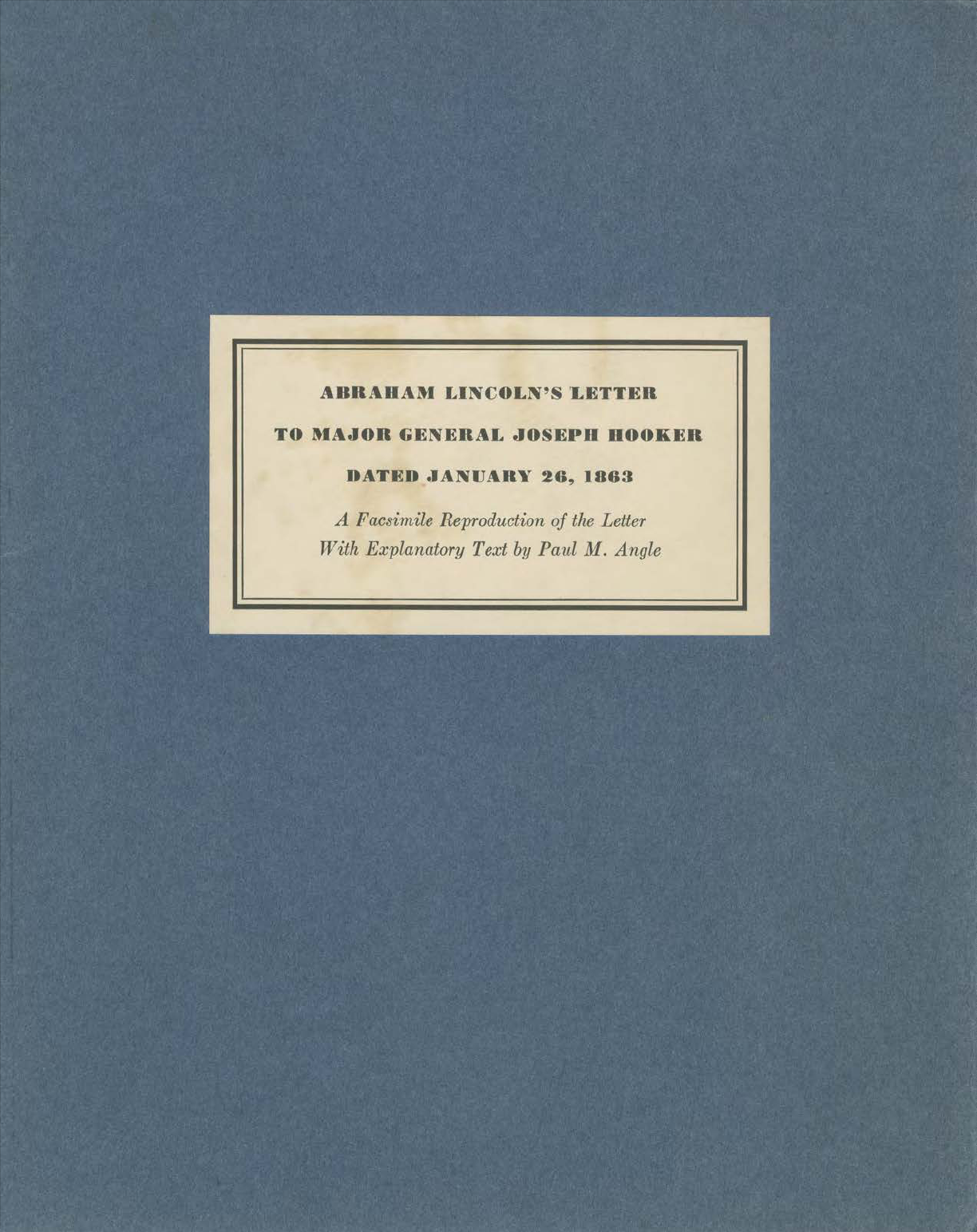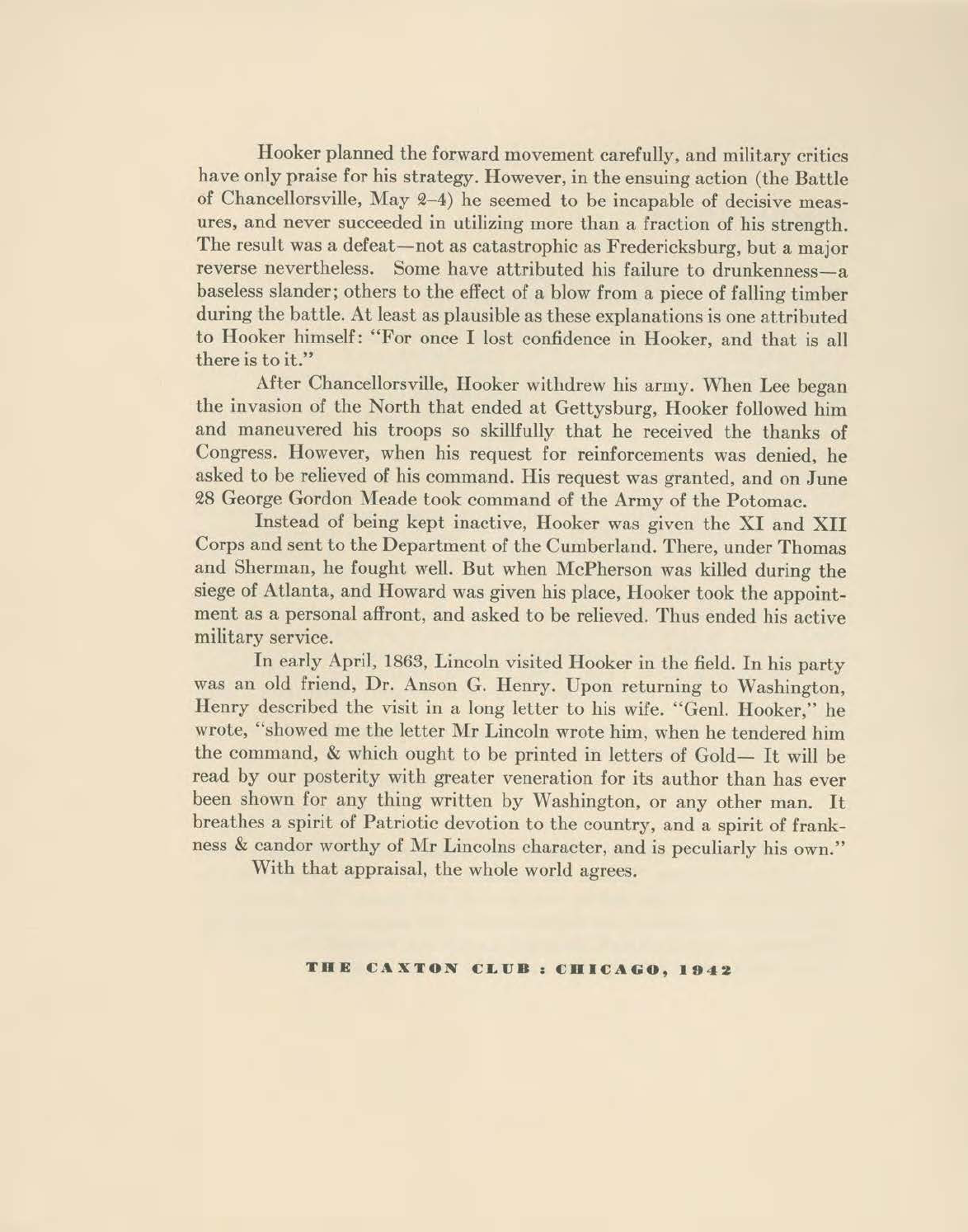
Mississippi State University Mississippi State University
Scholars Junction Scholars Junction
Pamphlets
Frank and Virginia Williams Collection of
Lincolniana
1942
Abraham Lincoln's letter to Major General Joseph Hooker, dated Abraham Lincoln's letter to Major General Joseph Hooker, dated
January 26, 1863 :a facsimile reproduction of the letter January 26, 1863 :a facsimile reproduction of the letter
Abraham Lincoln
Follow this and additional works at: https://scholarsjunction.msstate.edu/fvw-pamphlets
Preferred Citation Preferred Citation
[Physical ID#]: [Item Title], Frank and Virginia Williams Collection of Lincolniana, Mississippi State
University Libraries.
This Pamphlet is brought to you for free and open access by the Frank and Virginia Williams Collection of
Lincolniana at Scholars Junction. It has been accepted for inclusion in Pamphlets by an authorized administrator of
Scholars Junction. For more information, please contact [email protected].

ABRAHAM
LINCOLN'S
'LETTER
TO
MAJOR
GENERAL
JOSEPH
HOOKER
DATED
JANUARY
2G,
1883
A Facsimile
ReJ)'1'oduction
of
the Letter
With
Explanatory Text by
Paul
M.
Angle


.....
<extcutivt {Uansi.on.
CJf1t.1tft7;1ton,
fb&
,
f'cYtJf
. .
.
¥~½~,
F .
·.
~-
' '
J~~r,,.;e-~,/4.....,7
1~~-
-er~
..
o/~
fo ~ --~ fo; w
,,
yJ~
J::~rr;./4-.,..;·~~
.
a::.
'
;_;~~-~,
~r
J~r;;,-fo,,,__~....._,
/A~~
~I~/
7~
J~,
J~/4~_
~re>'-c~~u~~~.~
h-J
r
~,;,
q..,
(hv'v
-
~-
~-
a,....;
~,
/~~y.,~
r,-cl
_.
'1~
,~
-
/a.;:,w.
fa£."'~-
r•
13~
7~
~/
~~of~~~~L__,(;L,~
1/fw'
~r~q_
J~
4--tF~~
If/~~

.
7~
~hd~An/
?v
J)~
'
o/
..-<.,
fo
~_,
-
~J,
wt:. {
~,
c,,._,
~+~-
,lo.,,
af'rh
!~
~,
.,__.,
d
~.
&
4-
/~ r #-v
of
•
u;
-~
~M
~.,_
•
~-
J r ~ ,
,d.,
I~
Nw-tz;,,,.,,,,
rr-
.
Jr1~~~<9--,~-J~
A
I~
~.
Jt~
Jf/'~,
'/
k~
~I
~u0f7°J~~,,JM!:,
1~
r:z,
/\
o-v
fr..-(J'..r
h~
,,../7
l f
/I
• , '
t.,i£e;~~~~/r~~r
·
h
~,
/ltl'J
__
_
.
,.
r.,,.,.,.-o..-q
N

ABRAHAM
LINCOLN'S
LETTER
TO
MAJOR
GENERAL
JOSEPH
HOOKER
DATED
JANUARY
26,
1863
On November 17, 1941, Mr. Alfred
W.
Stern, a member
of
The Caxton Club,
purchased the most important
of
the thirty-odd letters written by President
Lin-
coln to General Joseph
Hooker-the
letter which
is
generally lcnown as
"The
Hooker Letter."
In
so doing, Mr. Stern has brought
to
Illinois what
is
recog-
nized
to
be
one
of
the finest Lincoln letters
in
existence, and one
of
the world's
great masterpieces
of
letter writing. The Caxton Club congratulates
Mr.
Stern
on his valuable acquisition, and expresses
its
gratitude for his permission
to
reproduce the letter here for the members
of
the Club.
DY
PAUL
l.U.
ANGLE
LIBRARIAN,
ILLINOIS
STATE
HISTORICAL
LIBRARY
(J
cE
again Abraham Lincoln was faced with
the
necessity of choosing
a commander for
the
Army of
the
Potomac. Before him,
at
the
White
House,
sat
:Major General A.
E.
Burnside, who
had
commanded
the
Army of
the
Potomac since early November, 186~.
From
his headquarters
near
Fredericksburg, Burnside
had
brought
an
order dismissing four of
his general officers from
the
service
and
relieving six others from active
duty.
The
order was
to
be
effective when approved
by
the
President.
The
alternative
to
approval, Burnside made clear, was
the
acceptance of his own
resignation.
Burnside, like McClellan
and
Pope
before him,
had
failed.
He
had
accepted
the
command of
the
Army of
the
Potomac with reluctance, protest-
ing
the
incapacity which his faulty generalship
at
the
Battle
of Fredericks-
burg
demonstrated a few weeks later. After
that
battle
his lack of confidence
in
himself spread quickly
to
the
army.
By
the
thousands, officers
and
men
disappeared
without
leave, while among those who remained
there
was con-
stant,
outspoken criticism. Aware
that
no commander could win battles
with
a disaffected
army,
Burnside chose
to
make
an
issue between himself
and
his
principal critics.
Either
they
or
he
must
go. Lincoln was
to
make
the
choice.

First
among those whom Burnside
had
marked
for dismissal was
Major
General Joseph Hooker, whom
he
charged
with
"unjust
and
unneces-
sary
criticisms of
the
actions of his superior officers,
and
of
the
authorities,"
and
characterized
as
"a
man
unfit
to
hold
an
important
commission during a
crisis like
the
present, when
so
much patience,
charity,
confidence, considera-
tion,
and
patriotism
are
due
from
every
soldier
in
the
field."
Yet,
when
Burn-
side was relieved
on
January
~5, 1863,
it
was Hooker whom Lincoln assigned
to
the
command of
the
Army
of
the
Potomac.
The
new commander was forty-eight years old. A
native
of :Massa-
chusetts,
he
had
graduated
from
the
United
States
Military
Academy
in
1837. Advancement came slowly
until
the
Mexican
War
when, for distin-
guished service
in
action,
he
was
brevetted
successively a captain, a major,
and
a lieutenant-colonel. After
the
war,
he
remained
in
the
army
for several
years,
but
finally, despairing of promotion
in
the
small peace-time establish-
ment,
he
resigned his commission
and
entered civil life.
·with
the
outbreak
of
the
Civil
War,
Hooker
proffered his services.
Like
many
other
officers of experience,
he
was
at
first ignored. However,
on
May
17, 1861,
he
was appointed brigadier-general of volunteers. Valorous
conduct
in
the
Peninsular Campaign a
year
later
won
him
a major-generalcy
and
the
nickname,
"Fighting
Joe."
The
second :Manassas,
South
:Mountain,
and
Antietam added
to
his
reputation,
and
while
he
protested vigorously
to
Burnside
about
his orders
at
Fredericksburg,
he
made
a magnificent
attempt
to
carry
them
out
when his
protest
was overruled.
His
fame,
both
in
and
out
of
the
army,
was certainly
not
lessened
by
his appearance
and
bearing: tall,
robust, handsome,
he
carried himself with
the
assurance
that
has
always
seemed
to
be
the
badge of
the
natural
fighting
man.
Having
long known
that
Burnside's dismissal was only a
matter
of
time, Lincoln
had
decided upon
Hooker
well in advance of his appointment.
The
selection, however, was
not
made
without
misgivings. When,
after
the
Second
Battle
of Bull
Run,
Gideon Welles
had
mentioned Hooker
as
a pos-
sible successor
to
Pope, Lincoln
had
nodded
in
approval.
"But,"
he
added,
"I
fear
he
gets excited."
To
Senator Orville
II.
Browning,
the
day
after
Hooker's
appointment,
Lincoln confessed
that
he
was
not
satisfied
with
Hooker's conduct,
but
that
he
did
not
know
what
better
he
could do
than
to
appoint
him.
The
most
explicit avowal of his reservations, however,
came
from his own
pen:

l
J
EXECUTIVE
MANSION,
Washington,
January
~6, 1863.
Major
General Hooker:
General.
I
have
placed
you
at
the
head of
the
Army of
the
Potomac.
Of course I
have
done
this
upon
what
appear
to
me
to
be
sufficient reasons.
And
yet
I
think
it
best for
you
to
know
that
there
are
some things in regard
to
which, I
am
not
quite
satisfied with you. I believe
you
to
be
a brave
and
a skilful soldier, which, of course, I like. I also believe
you
do
not
mix politics
with
your
profession, in which
you
are
right. You
have
confidence in your-
self, which is a valuable, if
not
an
indispensable quality. You
are
ambi-
tious, which,
within
reasonable bounds, does good
rather
than
harm.
But
I
think
that
during Gen. Burnside's command of
the
Army,
you
have
taken
counsel of
your
ambition,
and
thwarted
him
as
much as
you
could, in which
you
did a
great
wrong
to
the
country,
and
to
a most meritorious
and
honor-
able
brother
officer. I
have
heard,
in
such
way
as
to
believe
it,
of
your
re-
cently saying
that
both
the
Army
and
the
Government needed a
Dictator.
Of
course
it
was
not
for this,
but
in
spite
of
it,
that
I
have
given
you
the
com-
mand.
Only those generals who gain successes,
can
set
up
dictators.
What
I
now
ask
of
you
is military success,
and
I will risk
the
dictatorship.
The
gov-
ernment
will
support
you
to
the
utmost
of
its
ability, which is
neither
more
nor
less
than
it
has
done
and
will do for all commanders. I
much
fear
that
the
spirit
which
you
have
aided
to
infuse
into
the
Army, of criticising
their
Com-
mander
,
and
withholding confidence from him, will now
turn
upon
you. I
shall assist you as
far
as
I can,
to
put
it
down.
Neither
you, nor Napoleon,
if
he
were alive again, could
get
any
good
out
of
an
army, while such a spirit
prevails
in
it.
And now, beware of rashness- Beware of rashness,
but
with energy,
and
sleepless vigilance, go forward,
and
give us victories.
Yours very
truly
A.
LINCOLN
"He
talks
to
me
like a
father,"
said
Hooker
to
a friend when
he
re-
ceived Lincoln's letter.
"I
shall
not
answer
this
letter
until I
have
won
him
a
great
victory."
To
that
end
he
went
to
work
with
energy.
The
Army of
the
Potomac
was reorganized,
the
depleted ranks were filled, strenuous drill
and
field exercise were
instituted,
damaged morale was restored.
By
April,
the
.
troops were again in fighting
trim,
and
ready
for
the
offensive.

Hooker planned
the
forward movement carefully,
and
military critics
have
only praise for his
strategy.
However,
in
the
ensuing action (the
Battle
of Chancellorsville,
May
2-4)
he
seemed
to
be incapable of decisive meas-
ures,
and
never succeeded
in
utilizing
more
than
a fraction of his strength.
The
result was a
defeat-not
as
catastrophic as Fredericksburg,
but
a
major
reverse nevertheless. Some
have
attributed
his failure
to
drunkenness-a
baseless slander; others
to
the
effect of a blow from a piece of falling timber
during
the
battle.
At
least
as
plausible
as
these explanations is one
attributed
to
Hooker
himself:
"For
once I lost confidence
in
Hooker,
and
that
is all
there
is
to
it."
After Chancellorsville, Hooker withdrew his army. When Lee began
the
invasion of
the
North
that
ended
at
Gettysburg,
Hooker
followed him
and
maneuvered his troops so skillfully
that
he
received
the
thanks
of
Congress. However, when his request for reinforcements was denied,
he
asked
to
be relieved of his command.
His
request
was granted,
and
on
June
28 George Gordon :Meade
took
command of
the
Army of
the
Potomac.
Instead
of being
kept
inactive, Hooker was given
the
XI
and
XII
Corps
and
sent
to
the
Department
of
the
Cumberland. There,
under
Thomas
and
Sherman,
he
fought well.
But
when McPherson was killed during
the
siege of
Atlanta,
and
Howard
was given his place,
Hooker
took
the
appoint-
ment
as
a personal affront,
and
asked
to
be
relieved.
Thus
ended his active
military service.
In
early April, 1863, Lincoln visited
Hooker
in
the
field.
In
his
party
was
an
old friend,
Dr.
Anson G.
Henry.
Upon returning
to
Washington,
Henry
described
the
visit
in
a long
letter
to
his wife. "Genl. Hooker,"
he
wrote, "showed
me
the
letter
.1
\fr
Lincoln wrote him, when
he
tendered him
the
command, & which
ought
to
be
printed
in letters of
Gold-
It
will be
read
by
our
posterity with greater veneration for
its
author
than
has
ever
been shown for
any
thing
written
by ~ Tashington,
or
any
other
man.
It
breathes a
spirit
of
Patriotic
devotion
to
the
country,
and
a
spirit
of
frank-
ness &
candor
worthy
of
l\lr
Lincolns character,
and
is peculiarly his
own."
With
that
appraisal,
the
whole world agrees.
TOE
CAXTON
CLUB:
CHICAGO,
1942
